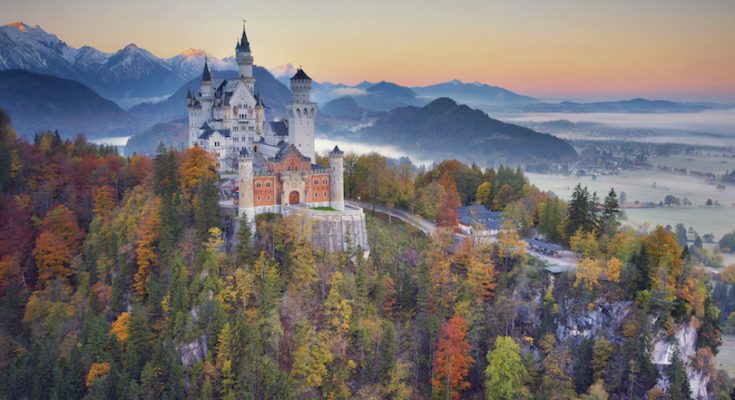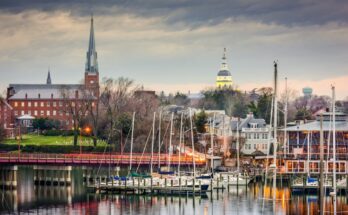With its layers of history and overlapping of cultures, Europe is a treasure trove of everything from the medieval and ancient to the baroque and art nouveau. Couple this with Arctic conditions in the north and beautiful Mediterranean climates in the south, and there’s a whole side of nature to go with the main dish of culture that can be found in this wonderful continent.
Sinking cities, leaning towers, and mystic old towns are mixed with Catholic churches, deep lochs, and sweeping fjords. This hotbed of history and civilization makes for an undeniably exciting place for any traveler to explore, so here are the top tourist attractions in Europe to help you plan your next trip.
25. Leaning Tower of Pisa
The world-famous leaning tower is known around the globe for its incredible four-degree tilt that makes it seem as if the tower is about to topple over. The amazing slanted belltower sits behind Pisa Cathedral and was built in the Romanesque style.
Dating back to the 12th century, the tower took a whopping 199 years to complete, but began to slant during its construction due to soft ground on one side. Today, the tower – which stands at a wonky 55.86 meters tall – attracts tourists from far and wide who want to catch sight of the tower and snap pictures of themselves in front of it.
24. Canals of Bruges

The arteries of the old town, the canals of Bruges have long been the roadways that connect the city. Bruges originally sat on the banks of the river Reie; as the city developed, so did its charming waterways. The canals were dug from the river for commercial shipping in order to move essential goods and supplies around the town.
Bruges’ inner canals mark the old city walls and ramparts and make for a beautiful area to explore on foot or in one of the many tourist boats. Cruise past the numerous old overarching brick bridges, sail along small streams, and spot the scenic riverside houses.
23. Cliffs of Moher

Located in Ireland’s County Clare, the Cliffs of Moher are an awe-inspiring sight. The coastal cliffs are made up of steep 214m stone and run for 14km from Hag’s Head to Doosouth. From the top of the cliffs, the Aran Islands can be spotted across the sparkling waters.
The coastal walking paths along the cliffs make for a fantastic ramble among the natural landscape, where you can glimpse the castle-like cliffs. The cliffs have been the subject of many folk tales and stories, and have been featured in numerous films, such as Harry Potter.
22. Pompeii

In 79 AD, Mount Vesuvius erupted with devastating effect. Many small towns and settlements in the region were completely destroyed by the eruption, not least Pompeii. Ironically, being buried under layers of ash that fell from the volcano has led to an incredibly well-preserved snapshot of a Roman city frozen in the midst of a disaster.
Though a few valuables were taken through the centuries, the site was rediscovered and has been excavated since 1764. Nowadays, visitors can walk around the ancient city and marvel at preserved colorful murals and see the plaster casts of people and animals in their final moments.
21. Meteora

Meaning “elevated” in Greek, Meteora is a jutting rock formation in Thessaly, Greece – a wild landscape made up of hill-like boulders that dominate the skyline. Part of what makes that magnificent landscape so amazing, however, are the monasteries that precariously cling to the rocks.
Set on cliffs with staircases cut into the very stone itself, this religious site dates back to the 15th century, and some still welcome visitors to this day. The most famous of all, the Holy Trinity Monastery, perches an amazing 400 meters atop a natural rock tower and is a breathtaking sight to set eyes on.
20. Sagrada Familia

Officially the Basilica de la Sagrada Familia, this famously opulent church in Barcelona is the brainchild of the renowned Catalan architect Antoni Gaudi. With work starting on the church back in 1882, 137 years later, the Sagrada still remains unfinished. It is expected that the building will be completed in 2026.
Built in the art nouveau and gothic styles, the fantastical church has an impressive eight spires and ten that are yet to be constructed. This decidedly Gaudi-esque building draws crowds of tourists with twisting turrets, and surreal curves, while intriguing gargoyles make for something from another world and time entirely.
19. Tallinn Old City

Once part of the trading alliance the Hanseatic League, Tallinn was formerly an extremely prosperous city. The riches of Tallin’s past can be seen be in the Old City, which still retains its 13th-century city plan. Authentically medieval, there are grand merchant’s houses and churches lining the cobblestone streets.
One of the major sites in this cultural and historical heart of the Estonian capital is the Town Hall Square, home to the gothic Town Hall. Elsewhere, you’ll find Estonia’s oldest church, the 13th-century cathedral of Saint Mary the Virgin, set on Toompea Hill. Today, it’s not just the historic buildings that make the area so charming; there are also numerous bars and shops to enjoy too.
18. Tower Bridge

Often mistakenly thought to be London Bridge, Tower Bridge is a late Victorian masterpiece showcasing the height of London’s standing on the world stage. Opened in 1894, the bridge crosses the Thames close to the Tower of London, another London landmark.
The bridge itself is a drawbridge powered by engine rooms which are located in the neo-gothic north and south towers, making this a feat of 19th-century engineering. The bridge is still in use to this day and has even been modernized with lights that glimmer in the evening.
17. Neuschwanstein Castle

One of the architectural projects of “Mad” King Ludwig II of Bavaria, Neuschwanstein Castle is the quintessential fairytale castle. In fact, it was the castle’s soaring spires and romanesque revival style that inspired Walt Disney’s Sleeping Beauty Castle.
Construction of the castle began in 1869, but sadly, Ludwig never got to live in his castle; he died in 1886, the same year of the castle’s completion. Set in South Bavaria among forested mountains and mirror-like lakes, the picturesque setting of the castle is as impressive as the building itself.
16. Mont Saint-Michel

This famous fortified island is located around a kilometer off the northwestern shores of Normandy, France. Walking around Mont-St-Michel might feel as if you have been transported back to another time; the monastery here dates back to the 8th century and is still in use today. The old walls and chapels are intriguing places to explore.
At high tide, waters make the island seem as if it is a floating fortress in the sea. Previously only reachable by foot or car during low tide, the island can be reached at any time on foot along a bridge built in 2014.
15. Scottish Highlands

The Scottish Highlands form a rugged, mountainous region of Northern Scotland. There are many things to do in amongst the dramatic scenery of this picturesque area. There’s Glencoe Valley where red deer roam and waterfalls hide; close to here, Ben Nevis calls with the highest mountain peak in the United Kingdom.
Elsewhere, Loch Ness sits in the Central Highlands and is where you can try to catch a glimpse of the legendary Loch Ness Monster, or simply take a stroll and enjoy the serene atmosphere. The Scottish Highlands are also home to Inverness, the largest city in the region. Nearby Moray Firth is where you may be able to spot dolphins playing in the sea.
14. Lake Bled

Set in Northwest Slovenia close to the town of Bled is a gleaming emerald lake surrounded by stunning verdant hills. Catch one of the old wooden boats called pletna over to the small Bled Island in the middle of the lake. The island is home to the Church of the Assumption of Mary – a 17th-century building with some 15th-century gothic frescoes still intact.
Around this incredibly picturesque spot, there’s also Bled Castle, but one of the best things to do in the area is to simply stroll around the lake and take a break for a swim in the calm waters.
13. Saint Basil’s Cathedral

Arguably the most iconic sight in Russia, this twisting Cathedral with its multi-colored onion domes is set in Moscow’s equally iconic Red Square. St Basil’s Cathedral was also built by a very iconic man – Ivan the Terrible – in 1555.
The structure is a madly bright lollypop of strange styles that seem more like a funfair and look unlike anything else in Russia. Because of its unique architectural style and its historic links to a victorious battle in Tatarstan, the cathedral is a symbol of Russia.
12. Dubrovnik Old Town

One of the most beautiful old towns in Europe, Dubrovnik’s Old Town is a red-roofed marvel that is asking to be explored. Its ancient city walls jut out into the Adriatic Sea, and its cobblestone streets hide a plethora of restaurants, bars, boutiques, and museums.
Dating back to the 16th century, the stone walls boast baroque churches and crumbling buildings. Built in 1573, Pile Gate marks the entrance the Old Town with its remarkable renaissance arches – it’s particularly beautiful when lit up at night. The Dubrovnik Cable Car offers the opportunity to see the ancient streets of the city from above.
11. Canals of Amsterdam

Amsterdam is well known for its canals. In fact, there are more than 100 kilometers of canals weaving around the Netherland’s capital, forming around 90 islands and requiring 1,500 bridges to get around. The waterways lead to Amsterdam being labeled the ‘Venice of the North.’
The Grachtengordel is Amsterdam’s canal district, where the four main canals form concentric rings around the city center. Dug in the 17th century, the canals were used for transportation, as sewers, as drinking water – a bit of everything. In the modern city, the canals make up the charming cityscape that Amsterdam is known for. The canals are backed by 17th-century townhouses, adding even more to the charm factor.
10. Eiffel Tower

Named after Gustave Eiffel, the unmistakable symbol of Paris is a sight that must be witnessed when visiting the French capital. Constructed between 1887 and 1889, the tower was originally built to be the impressive entrance to the 1889 World’s Fair. The tower stands at 324 meters tall and was amazingly the world’s tallest man-made structure until the Empire State Building took the title in 1930.
Take the lift all the way to the observation deck of the tower and marvel at the views of the Parisian boulevard and pattern of parks below. Or simply sit on the Champ de Mars and marvel at the lattice structure itself.
9. Prague Old Town

The medieval Old Town of the Czech Republic capital is bristling with historical sights, which is what makes it such a popular destination. At its heart is the Old Town Square, where you’ll find the Old Town Hall, boasting the Orloj – or Astronomical Clock – which dates back to 1410, making it the oldest clock still in operation in the world.
Connecting the Old Town with the Lesser Town of Prague across the Vltava River is the Charles Bridge. Construction on the bridge started in 1357 but wasn’t completed until the early 15th century. Around the Old Town, plenty of bars and a buzzing nightlife scene make for an enjoyable place to stick around after dark.
See also: Where to Stay in Prague
8. St. Peter’s Basilica

Located in Vatican City, St Peter’s Basilica is the biggest church in the world, and one of the most famous examples of Italian Renaissance architecture. Construction began on this monument in 1506, with one of the architects being none other than Michelangelo.
This is where the Pope himself addresses the tens of thousands of worshippers who crowd the adjacent St Peter’s Square. The current Basilica replaced the old St Peter’s Basilica, which stood in the same place from around 360 AD. The church itself is thought to be built over the tomb of St Peter.
7. Canals of Venice

Venice is the original canal city; every other canal city in the world is compared to Venice. The enigmatic waterlogged city is the site of more than 150 waterways and 400 bridges, including the famous Bridge of Sighs.
See also: Where to Stay in Venice
The main canal in Venice is the two-mile-long Grand Canal, which flows past St Mark’s Square and is lined with some of Venice’s historic architecture – from the Medieval to the baroque. Gondoliers punt visitors around wearing striped shirts and wide-brimmed hats, but boats on the river are not just for tourists; they are also used for everyday jobs such as rubbish collection.
6. Palace of Versailles

Versailles is a monument like no other; when it comes to palaces, Versailles definitely takes first place. This grandiose building was the main residence for French royalty from 1682 until the 1789 French Revolution.
The exterior of the castle is enchantingly ornate, but its interiors are no less impressive. Some rooms inside the building are as famous as the palace itself, such as the Hall of Mirrors with its opulent gilded decoration. The geometric Garden of Versailles is punctuated with conical trees and woven as canals and fountains.
5. Fjords of Norway

One of the top reasons many people travel to Norway is to see its majestic fjords. Shaped by glaciers over an incomprehensibly long 2.5 million years or so, the towering U-shaped valleys and their carved cliffs create a stunning landscape that’s almost too huge to take in.
Norway boasts over 1000 fjords, only a portion of which are visited en masse (like the Hardangerfjord and Geirangerfjord), meaning it’s still possible to find a slice of solitude. Taking a cruise ship is a great way to see the soaring walls of the fjords as the boat glides on the waters. Alternatively, hiking atop the fjords offers a birds-eye-view of the incredible landscape.
4. Alhambra

Built on the ruins of Roman fortifications in 889 AD, Alhambra is a combination palace and fortress situated in Granada, Spain. For almost 1,000 years, much of the Iberian peninsula was ruled by the Islamic Moors, with Andalusia (the area where Alhambra is located) being their longest-held territory.
Today, you can explore its citadel, the oldest part of the fortress, climb up its watchtower, explore the amazing Moorish gardens and courtyards, and be amazed at the delicate geometric patterns throughout the complex. The setting on the backdrop of the Sierra Nevada makes Alhambra that much more mystical.
3. Hagia Sophia

For almost 1,000 years, Hagia Sophia was the biggest cathedral in the world and is still a fantastic structure to set eyes on. Originally built as an Eastern Orthodox Cathedral in 537 AD when Istanbul was named Constantinople, Hagia Sophia became an Ottoman mosque from 1453 and is today a museum for all faiths to enjoy.
The dome of the Hagia Sophia is a marvel in itself, and the building as a whole perfectly reflective of Byzantine architecture – as well as Istanbul’s patchwork heritage. Walking around the building today, you can piece together the history of the city with its intriguing murals and interesting artifacts.
2. Acropolis

The Acropolis in Athens is a simply stunning sight. This monumental hill is the location of a number of ancient sites that date back to the 5th century BC. Some of the attractions that crown the Acropolis include the Temple of Athena Nike, the Erechtheion, and, of course, the Parthenon.
See also: Where to Stay in Athens
Constructed at the peak of the Athenian Empire in 447 BC, the Parthenon is a symbol of Greece and impresses with its innumerable columns. Dedicated to Athena, it became a Christian church in the 6th century AD and a mosque in the 1460s after the Ottoman invasion. After nightfall, the Acropolis is lit up with a glow that can be seen around Athens.
1. Colosseum

The Colosseum is the perfect symbol of the power of the Roman Empire at its height. Dating back to 72 AD, it was designed to hold 50,000 spectators and was, at the time, the biggest amphitheater ever built. Here, all manner of public spectacles were shown – from animal hunts and executions to gory gladiator battles; it was even filled with water for mock sea battles.
See also: Where to Stay in Rome
Although practically a ruin, the Colosseum is still very much an icon of Rome. Step inside the arches and take a tour of the structure. Sit and imagine yourself as a spectator in Roman times, and the grand displays and spectacles that went on inside the ring.



